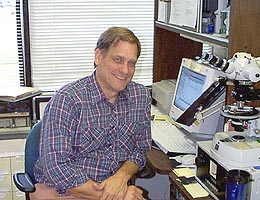 Curator's Comments
Curator's CommentsI was looking at the lunar program for the upcoming LPSC 32 and found 4 sessions with 52 oral talks and 32 papers presented as posters. This formidable list of Lunar presentations is largely due to the recent CAPTEM (Curation Analysis Planning Team for Extraterrestrial Materials) science initiative 'New Views of the Moon" (described in the last issue of "Lunar News"). This effort to bring together detailed studies of samples with remote sensing studies has not only given us new insights into lunar processes, but also new insights into how effectively we can study other planetary surfaces. These studies emphasize the importance of both return samples and remote sensing studies and the increased value of using them in concert.
Our program for long term display samples has received a boost with the successful design of a new display container that is easier to build and assemble. This will allow us to continue a program that provides an important means for people around the world to share the fascination we in lunar science have for the lunar rocks. The one note of caution I must inject here is that we have a limited number of rocks left that can be used for these kinds of displays.
CAPTEM has recently completed a review of the Lunar Facility. Our building, affectionately known as 31N, is now over 20 years old and we need to determine how well it is holding up. In fact, it is holding up very well, but nothing lasts forever. We are initiating a thorough evaluation of the state of the building and will determine changes and improvements that need to be done. As a part of this review, CAPTEM has decided to begin a concerted effort to review all proposals as they are received and not wait for one of the 2 meeting per year to evaluate them. So there is no need to wait until the deadline is near to submit requests. Send them in when the ideas strike you. We cannot guarantee that all requests can be handled this way, but those that can will. Spreading out the processing of lunar sample requests should speed up the allocation time. In fact you will have an opportunity to comment on the request/allocation process in the future. At the last meeting in October, 282 samples were approved for allocation and those allocations are nearly completed.